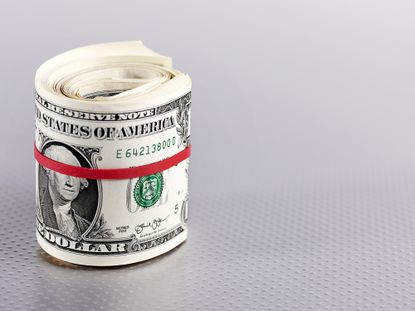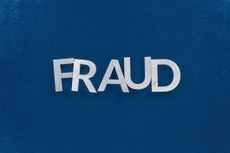How to Pay the IRS if You Owe Taxes
There are several ways to pay the IRS if you owe, but just because you can pay taxes over time doesn’t always mean you should.


If you are worried about how to pay the IRS because you owe taxes, you're not alone. The cost of living in the current economy can make paying the IRS feel like an impossible task. However, the federal tax payment deadline is less than two weeks away for most people. (Some states have IRS tax deadline extensions due to natural disasters.)
If you don't pay up by the due date, the IRS can impose costly penalties. The good news is that if you cannot pay your taxes in full, the IRS offers payment plans that might make things easier for you. But those plans might not be the best choice for everyone.
How to pay the IRS: Pay taxes in full
If you can pay your tax bill in full by the tax deadline, you probably should. Paying your taxes in full and by the due date saves you money. You won’t incur setup fees, accrue interest or face financial penalties. If you miss the April 15 tax deadline, you should still pay your taxes as soon as possible.

Sign up for Kiplinger’s Free E-Newsletters
Profit and prosper with the best of expert advice on investing, taxes, retirement, personal finance and more - straight to your e-mail.
Profit and prosper with the best of expert advice - straight to your e-mail.
The IRS provides several ways for taxpayers to make payments on their tax accounts.
- Pay with direct pay (requires identity verification)
- Pay through your online IRS account
- Schedule a payment when you e-file
- Mail a check or money order
- Pay with cash at an IRS Taxpayer Assistance Center (requires an appointment)
- Pay with cash at a participating retailer (up to $1,000)
IRS payment plan
If you can’t make your full tax payment by the due date, you might qualify for an IRS online payment plan.
IRS Short-Term Payment Plan. The IRS offers short-term-payment plans that allow you to pay what you owe over a period of 180 days or less.
- However, you will still face penalties and interest until you have paid your tax bill in full, so over time, the payment plan will cost you more than if you pay by the date your taxes are due.
- To qualify for a short-term plan with the IRS, you must owe less than $100,000 between your tax bill, penalties and interest.
- There is no setup fee for this plan.
IRS Long-Term Payment Plan. You might still qualify for an IRS online payment plan if you need more than 180 days to pay off your tax debt. Individuals who have already filed all their required tax returns can apply for a long-term payment plan when they owe no more than $50,000 total between taxes, interest and penalties.
As with the short-term payment plan, your tax bill will continue accruing interest and penalties until the full amount is satisfied. You will make monthly payments until you have paid the bill in full.
- When you owe more than $25,000, the IRS requires you to make payments through automatic withdrawals. This option comes with a $31 setup fee, but taxpayers with low income can have this fee waived.
- When you owe $25,000 or less in total taxes, penalties, and interest, the IRS allows you to make payments without enrolling in automatic withdrawals. This payment arrangement requires a higher setup fee of $130, but that amount drops to $43 for workers with low income.
- In some cases, the IRS can reimburse this initial cost. If you are a taxpayer with low income, and the online system does not waive the setup fee, you can fill out Form 13844 to request a fee reimbursement.
Revise an existing IRS installment agreement
If you already have a payment plan with the IRS, you can sometimes make changes to that plan online to add new tax debt. While you can alter the monthly payment amount, you must pay at least the set minimum amount or the system will prompt you to fill out Form 9465 and Form 433-F.
Revising an existing IRS payment plan requires a $10 revision fee, but some taxpayers can have this cost waived. (The IRS will automatically waive this fee if the system recognizes you as a taxpayer with income at or below 250% of the federal poverty level).
Guaranteed installment agreement
Some individual taxpayers might qualify for a guaranteed payment agreement. To qualify for this agreement, you must owe $10,000 or less and agree to pay in full within 3 years. You also must have filed required tax returns for the past 5 years and not owe tax from prior years. However, taxpayers who have already entered into a payment agreement with the IRS are not eligible for a guaranteed installment plan.
Paying taxes in 2024
If you cannot pay your taxes in full before the tax deadline and you don't want to enter into a payment agreement with the IRS, there are some other things you might consider as you try to ease tax debt stress.
- Don't file your federal tax return late. If you requested an extension to file your 2023 federal tax return, make sure you file by the Oct. 15 tax deadline. That way, you avoid a failure-to-file penalty, which would unfortunately increase your tax burden if you already owe. In some cases, if there's a good reason why you can't pay your taxes on time, you may be able to get penalty relief from the IRS. But there are restrictions on what counts as a "good reason," so this is not as easy as it might seem.
- File as soon as possible if you miss the tax deadline. The failure-to-file penalty is 5% of your taxes due for every month (or partial month) your return is late, so filing as soon as possible can prevent you from paying even more.
- See if you are eligible for an Offer in Compromise with the IRS. Some taxpayers can make an offer to the IRS to settle their tax debt for less. (This is known as an offer in compromise agreement). Not everyone is eligible for this type of agreement, however. The agency has a tool on its website that can help you determine if you might be eligible to settle with the IRS for less than you owe.
- Consider whether you have other legitimate ways to pay the IRS. For example, some people opt to borrow from family or good friends or take out personal loans to pay their tax bills. Of course, there are always pros and cons to borrowing money, so it's important to assess all of your options.
What happens if you don't pay your taxes?
Remember: If you don't pay your taxes on time, the IRS will impose a penalty. The dollar amount of this penalty is based on the taxes owed and how long they remain unpaid. You will be charged a 0.5% penalty for each month (or partial month) until you have satisfied your bill, up to 25% of your total unpaid taxes. So, while figuring out how to pay the IRS when you owe taxes can feel frustrating, it’s best to take action as soon as possible.
In addition to the penalties mentioned, failing to pay or to make an agreement with the IRS to pay your taxes over time can sometimes lead to more severe consequences, such as a federal tax lien on your property. The IRS could also possibly seize certain assets or garnish your wages. If you're worried that you can't pay on time, you may want to consult a qualified tax professional.
Related Content
- When Are Taxes Due in 2024? Tax Deadlines by Month
- Tax Tips for Last-Minute Filers
- States With IRS Tax Deadline Extensions This Year
- How to Lower Your Tax Bill

Katelyn has more than 6 years’ experience working in tax and finance. While she specializes in tax content, Katelyn has also written for digital publications on topics including insurance, retirement and financial planning and has had financial advice commissioned by national print publications. She believes that knowledge is the key to success and enjoys helping others reach their goals by providing content that educates and informs.
-
 Stock Market Today: Nasdaq Spirals as Netflix Nosedives
Stock Market Today: Nasdaq Spirals as Netflix NosedivesA big earnings boom for credit card giant American Express helped the Dow notch another win.
By Karee Venema Published
-
 Get These 40 Earth Day Deals and Discounts
Get These 40 Earth Day Deals and DiscountsMonday, April 22, is Earth Day. Many of your favorite retailers are celebrating with deals on sustainable products, recycling services, and more
By Kathryn Pomroy Published
-
 'Instant' EV Tax Credits Are a Hit: $580M Paid This Year
'Instant' EV Tax Credits Are a Hit: $580M Paid This YearEV Credits Claiming federal electric vehicle tax credits at the point of sale is a new and popular option in 2024.
By Kelley R. Taylor Last updated
-
 Retirees Face Significant Tax Bills Due to Fraud
Retirees Face Significant Tax Bills Due to FraudFraud A new report sheds light on how older adult scam victims end up with big tax bills and lost retirement savings.
By Kelley R. Taylor Last updated
-
 Tax Day: Is the Post Office Open Late?
Tax Day: Is the Post Office Open Late?Tax Filing Tax Day means some people need to mail their federal income tax returns.
By Kelley R. Taylor Published
-
 High Earners: Beware of These Illegal Schemes to Lower Taxes
High Earners: Beware of These Illegal Schemes to Lower TaxesTax Schemes The IRS says high-income filers are targets for several illegal tax schemes.
By Katelyn Washington Last updated
-
 Mailing Your Tax Return This Year? What to Know Before You Do
Mailing Your Tax Return This Year? What to Know Before You DoTax Filing There are plenty of reasons not to mail your tax return this year, but here’s what you should know if you are.
By Katelyn Washington Last updated
-
 IRS Warning: Beware of Smishing and 'Helper' Tax Scams
IRS Warning: Beware of Smishing and 'Helper' Tax ScamsScams Tax season is a time to look out for email and text message scams.
By Kelley R. Taylor Last updated
-
 Most Expensive States to Live in for Homeowners
Most Expensive States to Live in for HomeownersProperty Taxes High property tax bills make the places on this list the most expensive states for homeowners to live in.
By Katelyn Washington Last updated
-
 Don’t Miss This $2,500 Tax Break for Paying Your Student Loan
Don’t Miss This $2,500 Tax Break for Paying Your Student LoanTax Deductions Do you qualify for the student loan interest deduction this year?
By Katelyn Washington Last updated